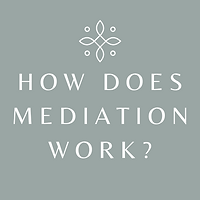Why Mediate?
Mediation offers a calm, constructive way to resolve family disputes without the stress, cost, or delays of going to court. It places you in control of the decisions, allowing both parties to discuss issues openly with the support of a trained, neutral mediator.
Mediation is faster, more flexible, and focused on practical solutions—helping you reach agreements that work for your family, especially your children and finances. It’s a future-focused approach that reduces conflict and supports better long-term communication.
How Does Mediation Work?
1
Book your MIAM (Mediation Information and Assessment Meeting)
The first step in the mediation process is the MIAM, where each person meets individually with a trained mediator. This is a confidential meeting to assess whether mediation is suitable for your situation. The mediator will explain how the process works, what to expect, and discuss any safeguarding concerns. It also gives you a chance to ask questions and decide if you’re comfortable proceeding. If mediation is appropriate, joint sessions can then be arranged.
2
Joint Mediation Sessions Begin following MIAMs
If both parties agree to proceed, joint mediation sessions will be scheduled. These meetings can be arms length (shuttle meetings) where the mediator 'shuttles' between both parties. The sessions are guided by the mediator, who helps keep the discussion constructive, balanced, and focused on resolving key issues. You’ll be encouraged to explore options, express your views, and work together to reach mutually acceptable solutions. The number of sessions required depends on the complexity of the matters involved. Sessions can cover parenting arrangements, finances, property, and communication plans.
3
Reaching and Recording an Agreement
Once agreements are reached, the mediator can draft a document such as a Memorandum of Understanding or Parenting Plan. These documents summarise what’s been agreed and can be taken to a solicitor if legal advice or court approval is needed. Mediation agreements are not legally binding on their own, but they form a strong foundation for court orders if required. This step ensures both parties have clarity and confidence moving forward. The focus is always on practical, child-centred, and lasting solutions.
The Family Mediation Voucher Scheme is a government-funded initiative designed to help separated parents access mediation more affordably, it is not a means tested initiative.
If your discussions relate to child arrangements, you may be eligible to receive up to £500 towards the cost of mediation.
At Family Mediation Online, we assess your eligibility during your MIAM appointment and handle all the administration for you. The voucher is paid directly to support your mediation sessions, reducing financial pressure and allowing you to focus on reaching practical, child-focused agreements.
The scheme has already helped thousands of families move forward more quickly, avoid lengthy court proceedings, and create more positive co-parenting pathways.
If you’re not sure whether you qualify, or you’d like to begin the process, book your MIAM today and our accredited mediator will guide you step by step.
Mediation Costs
Explore our range of services designed to support you through challenging times. Our experienced team offers financial remedy and child arrangements mediation with the option of order drafting service at a fixed fee of £495.
Book a Free
Call Back
We will call you on the same working day if booked before 3pm, we will always call you back within 24 working hours.
Our
Story
Family Mediation Online has selected a group of independent mediators who cover a wide range of specialisms. We believe that the right mediator for your matter can result in great results for you. By taking your time and talking to us, we will help you select your mediator.
Meet our Mediators.
Our mediators have been selected for their individual expertise and each bring a
specialism that can make a refined difference to your agreement.
Each and every one of our mediators is highly skilled and shares your goal to bring peace back to your life.

When is mediation
appropriate?
Family mediation is appropriate when separating couples or co-parents want to resolve issues without going to court. It is especially useful for discussing child arrangements, financial matters, or property division in a calm, structured setting. Mediation works best when both parties are willing to communicate and consider practical solutions. It can be used at any stage of separation and is often quicker, less stressful, and more cost-effective than legal proceedings. Mediation is not suitable where there are unresolved safety concerns, such as domestic abuse.
3 Steps to successful Mediation.
While every situation is unique, there are key principles that consistently lead to more positive outcomes. Approaching mediation with the right mindset and strategy can make a significant difference in the process and results. Below are three essential steps to help you make the most of your mediation journey. These steps are designed to guide you toward a constructive, respectful, and solution-focused experience.

Step 1: Prepare for Mediation with Clarity and Purpose
Before attending mediation, take time to understand your priorities and what you hope to achieve. Think carefully about your ideal outcome, but also be realistic about what compromises might be necessary. Gather any relevant documents or information that will help clarify your position. Stay focused on the needs of any children involved, as their wellbeing is central. A clear, calm mindset can set a constructive tone for the entire process.

Step 2: Communicate Openly and Respectfully
Successful mediation relies on honest and respectful communication. Listen actively to the other person’s views, even when you disagree, and avoid interrupting or escalating tension. Express your concerns and needs calmly, using "I" statements to avoid blame. Mediators are trained to keep discussions balanced and on track, so trust the process. Being open to different perspectives can often unlock new solutions neither side had considered.

Step 3: Focus on Solutions and Long-Term Outcomes
Rather than rehashing past grievances, focus your energy on reaching workable agreements for the future. Think about what arrangements will be practical, sustainable, and fair for everyone involved. If children are part of the dispute, their best interests must remain at the heart of any decisions made. Be flexible where possible, and remember that mediation aims to avoid court and reduce conflict. A successful outcome is one both parties can commit to and implement with confidence.
Specialist Areas
Price List & Instant Booking
1 hr
95 British pounds1 hr
95 British pounds1 hr
95 British pounds1 hr
95 British pounds1 hr
95 British pounds1 hr 30 min
240 British pounds45 min
120 British pounds1 hr 30 min
240 British pounds1 hr
120 British pounds1 hr
120 British pounds30 min
495 British pounds
Get in Touch
Family Mediation Online
Covering the Jurisdiction of
England & Wales.
Mediation available worldwide
Talk to Us.
Ready to take the first step? Book a free call with us today to explore how mediation can work for you.







.png)
.png)
.png)
.png)
.png)
































